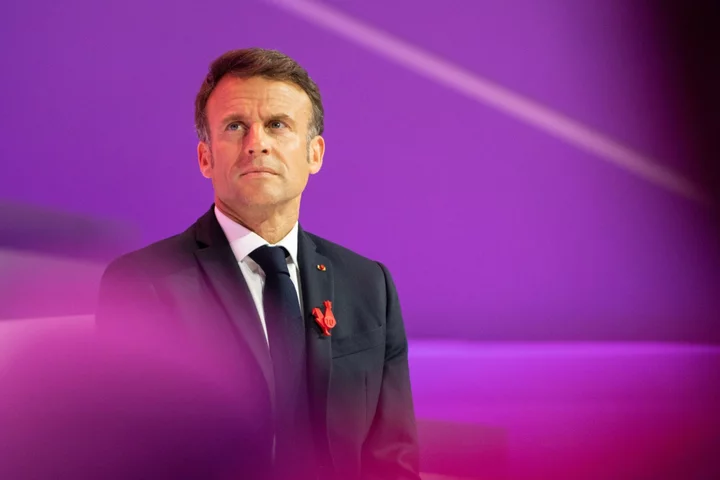World leaders are gathering in Paris this week as French President Emmanuel Macron seeks to build support for an overhaul of the global lending architecture.
Macron’s Summit for a New Global Financing Pact aims to change the way that multilateral institutions work to better support poor nations and address threats like climate change and future pandemics.
It will tackle issues ranging from the reform of international development banks to financing green infrastructure and mobilizing capital for countries vulnerable to extreme weather patterns.
The get-together comes at a precarious time for many nations in the so-called Global South, which have been crippled by debt overhang that’s set back their growth, left people in poverty and impeded their efforts to protect themselves from the changing climate.
For Bloomberg’s global currency-analysis tool, click here
Supporting them is a key strategic goal for Europe and the US, especially as they seek to counter Beijing’s growing economic influence in the developing word. China has become the largest official lender to many of the poorer nations across the globe.
For France, the summit is also a way to demonstrate Group of Seven countries are committed to supporting poor nations that may feel disenfranchised or left behind by wealthy allies that have shifted focus and poured vast resources to Ukraine over the past two years.
Officials in Paris say they hope the summit could ultimately lead to a revamp of the Bretton Woods institutions to reflect the world’s current policy priorities. The challenge is to deliver substantial financing to facilitate the green transition without taking away focus from fighting poverty.
While the summit is not expected to yield any major decisions, it is seen as a milestone on the road toward achieving progress on several key issues, including debt relief, that will dominate upcoming international meetings, a senior US Treasury official said.
The talks could produce consensus on a “to do” list of targets and a timetable setting out what global leaders have endorsed and expect to happen over the coming months.
Crucially, it will be a rare occasion where the heads of major wealthy creditor nations, from those participating in Paris Club to China or Saudi Arabia, are joined by their peers from low-income countries – as well as the heads of the International Monetary Fund and the World Bank.
“The Paris Summit is an opportunity to build and maintain momentum for reform of the international financial architecture,” Stephanie Segal, a senior fellow at the Center for Strategic and International studies and a former Treasury official. “Senior-level participation, at both the country and institutional level, can demonstrate the political support needed for reaching consensus on potentially contentious issues.”
Global Attendance
The issues on the agenda are particularly important to the US, which has led calls for an overhaul of multilateral development institutions like the World Bank to address global challenges and speed the flow of private capital to poor and emerging economies for climate finance and development.
US Treasury Secretary Janet Yellen, who will be attending the Paris meeting, has been calling for swift action to provide debt relief to nations like Zambia and Sri Lanka - whose presidents will also be in attendance.
Chinese Premier Li Qiang is also expected to participate in the discussions, marking the first time in months that a senior Chinese official is attending multilateral talks on these issues alongside the US.
Yet even as most leaders agree that the Breton Woods institutions are ripe for a revamp that reflects the current reality, agreeing on what that will entail can be contentious and take time, and ongoing debt distress and climate risks could spell deeper economic stagnation for large swaths of the globe.
“Climate is an epic challenge of our times, requiring trillions and trillions of dollars to tackle. Whenever big challenges arise, the world’s leaders and most famous come together to bring attention to the problem,” said Mark Sobel, US chairman of the Official Monetary and Financial Institutions Forum.
While that’s a good thing, the discussion focuses on “architecture” — including new institutions, financial engineering and debt mechanisms — but tackling climate change will take more than that, he said.
More Capital
“More capital – bigger banks — will surely be needed, yet this topic now goes unaddressed,” said Sobel, who is also a former US Treasury official who represented the US at the IMF.
More than half of the world’s low-income countries are at high risk of debt distress or already in it, and several have defaulted. But despite the Group of 20 having agreed in 2020 to a plan called the Common Framework to help borrowers restructure debts with many creditors under the same terms, not a single nation has received substantial relief under it so far.
Meanwhile, the World Bank has warned that low- and middle-income countries’ need for financing to lessen dependence on fossil fuels will only grow over the coming decade. Yet many of these nations are caught in a “poverty trap,” unable to afford the high up-front costs of switching to clean energy and, therefore, locked into higher costs and recurring payments for fossil fuels.
“Bold new thinking is great,” said Sobel. “But are we ready to put our money where our mouths are? Are we ready to roll up our sleeves, apply elbow grease and do the daily drudgery of the job?”

